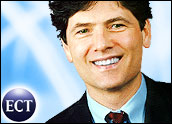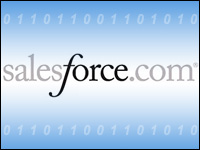
Marc Benioff, CEO of Salesforce.com, once began a conference in San Francisco with a surprise keynote address by a George W. Bush impersonator, so when I was invited to this week’s “Tour de Force” announcement I had inklings that we might see a facsimile of the New French president, Nicolas Sarkozy, or possibly get a glimpse of his new 40-year-old, ex-supermodel, tire-heiress girlfriend, Carla Bruni.
I should have known better. News outlets spread a rumor that le president married the tire heiress at the beginning of the week and they were unavailable. Then it was all taken back and, just to add clarity about his marital status, the 52-year-old president told journalists “Don’t count on me to confirm or deny it. My response is ‘no comment.'”
Whatever.
Instead, all we had to go on was the multiple entendre title of the conference and a French dictionary, and what a clever name it turned out to be. Originally billed more as a takeoff on the famous bicycle race, the “Tour de France,” the Tour de Force was more of a self-congratulatory eponym advertising the next step in Salesforce.com’s evolution from CRM company to application enabler. There was also the promise to go global with the event, so I am still holding out for Sarkozy-Bruni in Paris. It was also part of a bid by the company to make its software as ubiquitous as a bicycle on, well, the Tour de France.
Industrial-Strength Toolset
To make sure I had my facts right, I looked up “tour de force,” and the definitions all seemed to point in the same direction — a stroke of genius — so I think I am on safe ground with the self-congratulations angle. At any rate, the company actually made three announcements in total.
It announced the products that now make up what it calls its “Cloud Computing Architecture,” or CCA, which is supposed to bring virtually unlimited computing power to the enterprise through the Internet. The products include the Force.com Metadata API (application programming interface), a developer environment (Force.com IDE), a developers’ community for code sharing (Force.com Code Share) and the reintroduction of the Force.com Sandbox for testing.
Taken together, it’s an array of industrial-strength tools that all have analogues in the traditional application tools space — good thing, too because it is hard to see how on-demand application development could be expected to effectively compete with conventional coding unless these tools were made available and inexpensive. Not to worry, the next announcement took care of that.
The Price of Clouds
The second announcement dealt with just how much cloud computing would cost and it seems pretty cheap. More important than the pricing though, is the way the pricing works. I don’t have any information on the cost per developer and the announcements are mum on that, though I recall a fee of a bit less than US$200 per developer per month but that is so last year.
Whatever the developer cost, the user seat cost is metered by the login. For 2008, the cost per login for infrequent users (five or fewer logins per month) is only $0.99 each, though above that level, more typical users will pay a flat rate of $50 per month.
Given the cost of conventional software, this sounds pretty good, but the fly in the ointment is that a company with running (and paid for) software won’t have a great incentive to reinvent its applications just to take advantage of all this new and wonderful technology, at least not right away or in the volumes that might make shareholders sing. These announcements are about the future, so, not to worry again, the last announcement truly pulled a rabbit out of the proverbial hat and it might be the last announcement that deserved the accolade of tour de force the most.
Entrepreneurial Idol
Teaming up with Emergence Capital, Salesforce.com put up a $1 million prize in a venture competition for entrepreneurs and companies building on the Force.com platform. Simply put, it does for Force.com developers what “American Idol” does for aspiring singers. Emergence Capital will play the part of Simon Cowell judging entries along five parameters:
- Likelihood of long-term company success
- Demonstration of customer success and user adoption
- Market opportunity
- Track record and passion of the entrepreneurial team
- Adoption and innovative utilization of the Force.com platform technology
The winner will also get free space for a year at the Salesforce.com Incubator and spa in San Mateo, Calif. That all sounds very reasonable to me. I have seen a few business school competitions that do many of the same things with prizes that are mere fractions of what’s on offer here.
The idea is to announce the winners at DreamForce2008, which will be held in November. Nevertheless, it defies logic that the competition will end with a single champion; venture capital doesn’t work that way. Usually VC’s like to develop a basket full of upstarts, and I expect there will be second, third and maybe runner-up awards or at least recognition. It seems most likely, to me at least, that the class of 2009 — roughly 20 Incubator participants — will come from the ranks of this competition.
Uncharted Waters
So this announcement takes Salesforce.com just a little bit further away from CRM, though I would not suggest for a moment that the company will ever take its eye off that ball. However, these announcements do make Force.com more viable and it certainly points us all in the direction of a vast and uncharted future. More interesting to me than even all this is the fact that the $1 million competition also takes Salesforce.com further into a completely new realm — venture capital.
With a complete development and deployment environment, Salesforce.com has cornered or vertically integrated the means of production for one brand of software. For its part, Salesforce.com can expect to make a living building and enhancing the means of production while its partners will increasingly focus on the business idea and service to the customer.
Economists take note: David Ricardo lives.
Denis Pombriant is the managing principal of the Beagle Research Group, a CRM market research firm and consultancy. Pombriant’s research concentrates on evolving product ideas and emerging companies in the sales, marketing and call center disciplines. His research is freely distributed through a blog and Web site. He is working on a book and can be reached at [email protected].























































